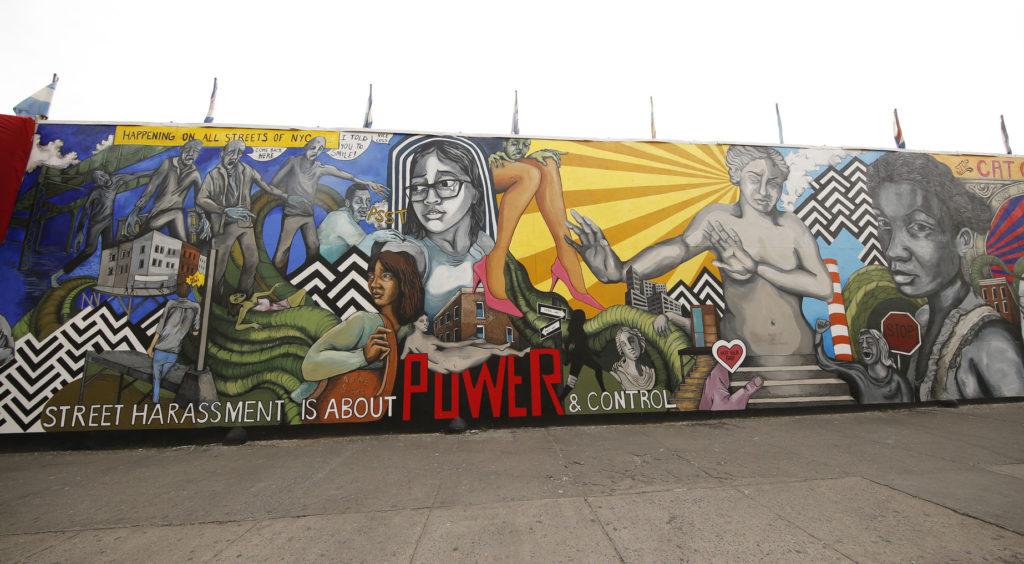Elaine Crory, Belfast, Northern Ireland, SSH Blog Correspondent

I’ve written at length about the damaging long-term implications of street harassment; about how it hurts the self esteem of women and girls and encourages the idea that public space belongs to men. It teaches us at a young and impressionable age that we should expect to receive comments on our appearance, be they positive or negative, when out in public. It teaches us to feel scared and ashamed when we are yelled at, followed or groped by men rather than to feel defiant and angry.
In the spirit of International Women’s Day’s 2017 theme Be Bold for Change, I want to look at some of the positive steps individual women and activist groups have taken to challenge the assumptions that allow street harassment to continue, and to suggest some ways that we can try to dismantle rape culture altogether and boldly change the rotten structures that hold it up.
Over the past decade, technology has advanced a great deal. Smartphones mean that most people have excellent cameras to hand at all times, and internet access at the touch of a button. When Hollaback! was originally conceived it was intended primarily as a way for women to share their stories and to gain strength from the expression of solidarity from others who “have your back”. Women were encouraged to snap photos, if they felt confident enough, and to challenge their harassers verbally.
Soon the word spread and it became clear that street harassment was an international phenomena with many regional quirks which allowed for responses as diverse and inventive as the women who experienced it. Women began to use social media to spread stories and share ideas, and a number of different groups sprang up, including our own Stop Street Harassment, with the aim of spreading resistance and standing up to the tired narrative that tried to convince us that it is all a harmless joke.
Individual women have spoken of how freeing it is to challenge harassers peacefully but forcefully, to put them in the spot and demand that they account for their behaviour – which, invariably they cannot – and how it becomes clear in doing so that what has happened is not their fault. Victim blaming is one of the decaying planks upon which the whole structure of rape culture rests, and challenging that has proven again and again to be a powerful antidote to the power of street harassment. In India a project by Blank Noise called I Never Ask for It collects stories and images of what women were wearing when they were harassed or sexually assaulted, the mundanity of the clothing giving the lie to the old excuse. Jezebel conducted an informal survey of circumstances in which women had endured harassment, and the variety is both impressive and proof positive that is is not about what we wear or where we go. The point of these exercises, more than anything else, seems to be to prove to ourselves and to society generally, that victim blaming will not wash. And there is power in that, in saying “no, this is all in you”.
What next, though? This list is endless and growing, a testament to the creativity and dedication of activists all over the world.
- In Mexico, activists chase their harassers with blaring feminist punk music and confetti guns, turning the shaming around quite beautifully.
- A Minneapolis woman created Cards Against Harassment that a victim can present to a harasser to challenge their behaviour.
- A beautiful and challenging mural has appeared in Brooklyn, New York.
- There is a week of action against street harassment coming up in April organized by SSH.
- Activists worldwide are organising events such as Reclaim the Night in my own city of Belfast and many other sites, to make it clear to all that street harassment will not be tolerated.
All of these actions are positive, confronting harassment directly in an active way. They challenge behaviour and help to put power back in our hands.
But the root causes of street harassment remain, and far too many people fail to understand why it is wrong. So the problem persists across generations. But it does not have to. When a number of universities introduced mandatory consent classes a significant number of young men reacted angrily, as though an understanding of consent and appropriate behaviour was simply innate and did not have to be taught. I would argue that this reaction demonstrates just how deeply rape culture has permeated, and shows that we have reached many of these young people too late. Comprehensive and compulsory sex and relationship education (SRE) that covers sexist attitudes and treatment of women in public space as well as in interpersonal relationships would go a long way towards preventing these harmful ideas from taking root to start with.
Let’s start where the problem starts. If the timbers that hold up rape culture are rotten, let’s replace them with some new planks fit to hold up confident, respectful and responsible relationships between all humans. Let’s be bold for change.
Elaine is a part-time politics lecturer and a mother of two. She is director of Hollaback! Belfast, co-organises the city’s annual Reclaim the Night march, and volunteers with Belfast Feminist Network and Alliance for Choice to campaign for a broad range of women’s issues.
